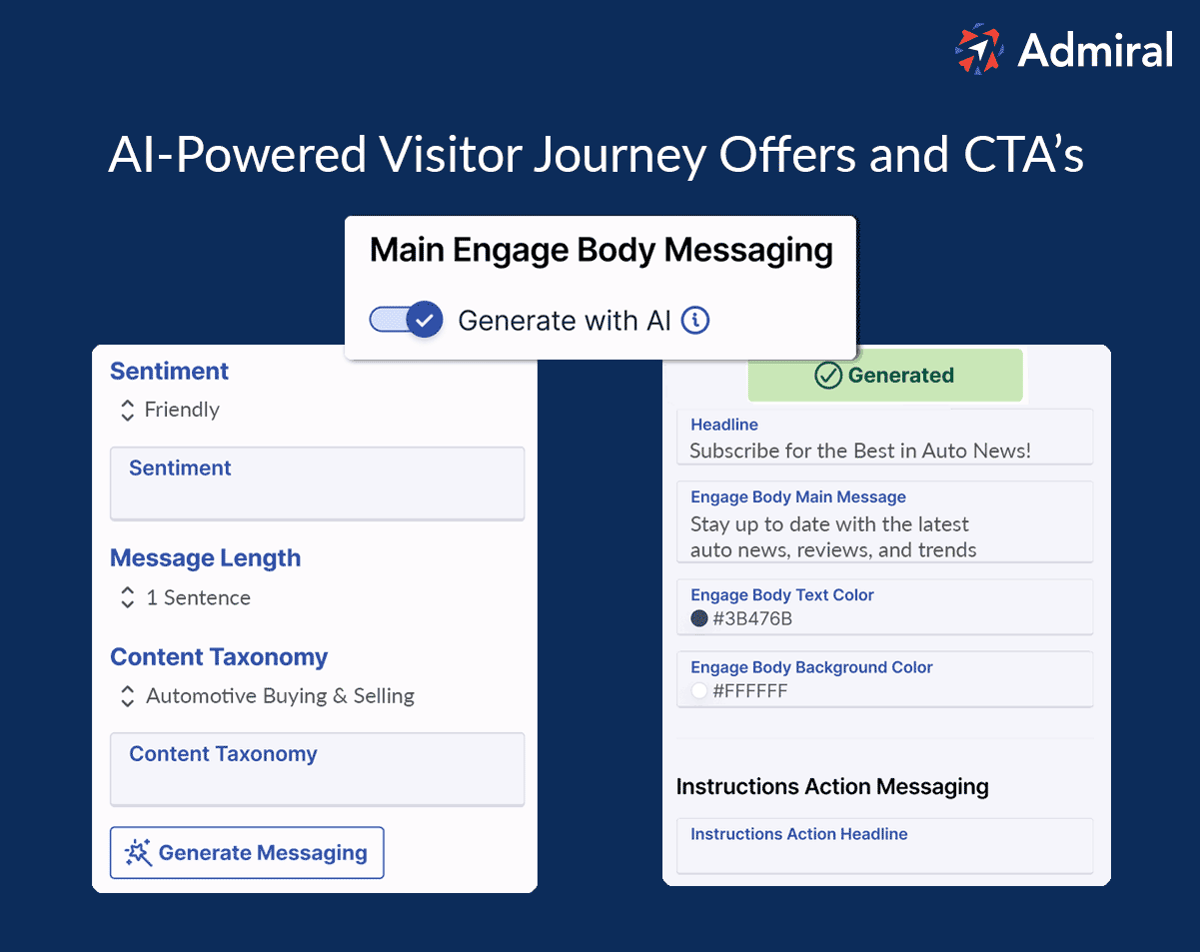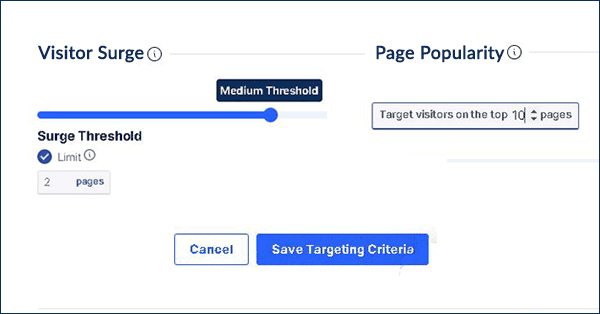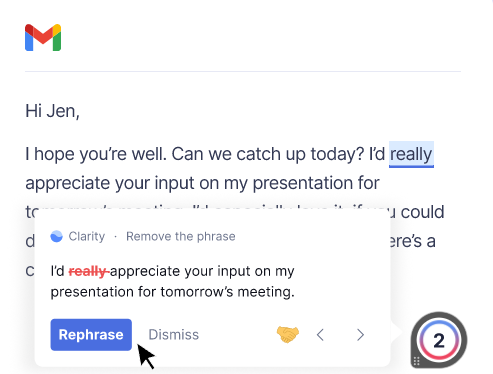Artificial Intelligence (AI) has been transforming businesses of all kinds, and digital publishing is no exception. AI and machine learning is revolutionizing the way digital publishers create, distribute, and monetize content, offering them unprecedented opportunities to grow their businesses.
AI can help digital publishers better understand their audiences, generate more user engagement and personalized content at scale. AI can also help digital publishers increase efficiency, reduce costs, and maximize ROI.
Overall, AI is playing a major role in the growth and success of digital publishing businesses, as it offers them the tools and insights necessary to stay ahead of the competition.
Jump to:
- How is AI revolutionizing digital publishing?
- Benefits of AI for digital publishers
- Examples of AI tools for publishers
- How can AI help publishers grow?
- Request a demo of AI for visitor engagement
How is AI revolutionizing digital publishing?
It might be tempting to turn your nose up at the thought of involving AI in the editorial content creation process. After all, artistic ability and creativity are inherently human traits, right? We’ll concede that for now, at least, current AI language models may not be capable of producing journalistic masterpieces fit for the New York Times. However, they can be incredibly helpful when used as a kind of sidekick for human authors to supercharge their handwritten content.
AI can help digital publishers in all sorts of interesting ways. Solutions abound, from offering keyword optimization suggestions as an article is being written, to increasing conversions with Admiral’s AI-Powered visitor CTA and offer creation.
Below, we’ll examine the benefits of some of the most popular types of AI tools available today.
Benefits of AI for digital publishers
- More effective visitor engagement: AI can be leverage key metrics in real-time to monetize your best content. AI can immediately identify content with surging traffic, such as a breaking or viral story. It can then trigger a custom CTA to better monetize that content in the moment.
Additionally, the copy within those CTA can be automatically generated by AI, with awareness of content vertical, sentiment, and objectives. - More discoverability: It’s a simple equation: publishers must be easily discoverable by their intended audiences in order to generate revenue. AI can help digital publishers better understand their audiences and generate more relevant and engaging content, which, in turn, will lead to improved discoverability.
- Enhanced content quality: Successful digital publishers don’t just publish content; they also curate content to engage and inform their readers. AI can help digital publishers better understand what their audiences respond to and resonate with, which enables more tailored content and contributes to an increase in quality.
- Improved efficiency: Digital publishing is a business of scale, and the more content a publisher can produce, the quicker it is likely to grow. AI can streamline the process of content creation — incorporating automated translations, grammar checks, and formatting rules — enabling publishing teams to focus on a combination of quality and quantity when generating content.
Examples of AI tools and technologies used in digital publishing
- Natural Language Processing (NLP): Natural language processing is a subfield of artificial intelligence that enables computer systems to interpret and understand human language. NLP tools such as Grammarly allow publishers to automate simple editing and formatting tasks, negating the need for multiple peer reviews and allowing them to focus on adding value through their content.
- Computer-Generated Imagery (CGI): AI tools such as Dall-E 2 allow users to enter a prompt (for example, “Chicken wearing an Admiral tri horn hat”), and their advanced system will generate a unique image matching its description. Results can vary in quality but are almost always visually appealing (or nightmare-inducing) in one way or another.

- Chatbots: Chatbots are increasingly being leveraged by digital publishers to interact with users and improve lead generation techniques. For instance, a chatbot such as crisp.chat (click here for more information on their offering) can nudge users toward a paid digital subscription by engaging them at precisely the right time during their browsing journey.
- Sentiment Analysis: Sentiment analysis is a subset of AI that aims to understand the feeling expressed toward a particular topic or issue. Sentiment analysis tools can help digital publishers understand the sentiment expressed towards their content and their advertisers, which enables them to create content and run ads that their readers are more likely to engage with.
How can AI help digital publishers to grow?
In most use cases, the primary advantage of AI in publishing — and in many industries, for that matter — is to streamline processes so that teams can expend their energy on more value-adding tasks. In the case of a publishing team, employing AI to take care of some of the more manual, menial tasks such as grammar checking and translation can enable content creators to focus on creating high-quality content at volume.
Some of the specific ways AI can help digital publishers to grow include:
1. AI-driven editorial decisions
A large part of a content strategist’s time is likely spent poring over editorial decisions — trending topics to cover, which stories are likely to resonate, which niches to target, and so on. AI can help publishers make more informed editorial decisions by delivering real-time and highly relevant insights about current trends and assessing the level of engagement with existing content. This allows publishers to make data-driven predictions about what is most likely to resonate with readers, and helps them to create proactive content strategies. For example:
- AI can predict the topics that will be most popular based on social media trends, search engine data, and so on.
- AI can identify which topics and stories are likely to resonate with readers based on real-time engagement and consumption data.
2. AI-powered content creation
Editors, such as the team at Arena Group Holdings, are exploring the use of AI to research and produce articles. An AI that has been trained on the proprietary library of a publisher's content can curate images or create drafts of new articles from the existing content. Publishers Daily reports that Men's Journal leveraged 17 years of archives, with AI assistance, to produce a number of articles that performed well in search, social, and form an RPM basis.
Of course, we’re now in an age where AI content generation tools such as Jasper are capable of generating entire articles by feeding it nothing more than a title or a brief outline. If you’re more concerned with the volume of content you can produce — and less with its overall quality — this may be an effective use of AI, but you should understand there are limitations.
However, AI can also be deployed in language translation, which is important for publishers whose content has an international audience — or those who want to grow their readership. Tools like Google Translate will struggle to meet high journalistic standards, whereas an AI-assisted service like Taia uses a combination of humans and machine learning to translate content into almost 100 different languages.
3. AI-optimized personalization strategies
For digital publishers, growth is often dependent on audience engagement. And one of the most effective ways to achieve this is through personalization: after all, users are far more likely to engage with content that’s tailored to their interests and matches their individual preferences.
This is another way in which AI can be leveraged by publishers; through machine learning, it can identify which content is more likely to resonate with a particular reader, and tailor the user experience so they are served highly relevant content.
Admiral's VRM platform offers sentiment options for our AI-Powered visitor engagement. Integrating ChatGPT, our visitor offers and CTAs combine sentiment with the content topic and visitor profile data to tailor offers that are more likely to convert.

AI-powered recommendation engines can identify not only which content to recommend to a user, but when to recommend it. By analyzing their past behavior — how and when they typically consume content, for example — AI ‘recommender-as-a-service’ tools such as Recombee can help publishers reach new levels of content personalization using intuitive APIs and SDKs created by data scientists.
4. AI-enhanced analytics and insights
One field in which AI has been particularly useful for businesses over the years is in the gathering of data to provide actionable insights. Publishing businesses can leverage AI for analytics and insights in some of the following ways:
- Predictive Analytics: Predictive analytics is a type of statistical analysis that uses historical data to predict future events. Predictive analytics can help digital publishers identify patterns in their content and audience data, allowing them to make better decisions around the types of content that are likely to resonate with readers.
- Engagement Analysis: AI can also analyze real-time engagement levels to help you understand how your current content is performing. Are there pages that are seeing sudden spikes in traffic? Is some of your content getting less engagement than you’d like? This data will help reprioritize existing content and improve marketing automation for publishers.
Admiral’s AI-driven Surge Targeting and Page Popularity tools do this, identifying where the surges in traffic are in real-time. Then Admiral’s VRM system automatically triggers visitor offers/CTAs on those pages. The Surge CTA may have a unique message, time frame, or feature designed to quickly increase conversions.
- Sentiment Analysis: As we’ve already covered, sentiment analysis can help digital publishers better understand how their audiences respond to and feel about their content, which can in turn be applied to the monetization of content.
5. AI-powered advertising solutions
Much of a publisher’s revenue comes from advertising, and this is another area where AI can be applied, automating the setup of many different ad formats and helping to match the relevant content to the right advertisers. Ways AI can assist with automated advertising strategies include:
- Automated Brand-Advertiser Alignment: Automated brand-advertiser alignment refers to the process of matching advertisers to content, helping digital publishers to drive more revenue by aligning their content with the most relevant ads.
- Automated Display Ad Customization: Display ad customization is all about tailoring display ads to specific audiences. Display ad customization can help digital publishers monetize content by ensuring the ads they display are relevant to the audience who are likely to see them.
- Automated Real-Time Bidding: Real-time bidding enables publishers to buy digital advertising space in real-time. This advertising strategy provides enhanced flexibility, it’s often more cost-effective and enables better targeting of ads.
- Ad Retargeting: Ad retargeting is when ads are shown to the people who have previously viewed a brand's content. These ads typically resonate more with these audiences as they've already shown an interest in related content, and therefore the ads are more likely to drive additional revenue.
6. AI creates efficiencies
Ultimately, all the above points add up to a more streamlined, more efficient digital publishing operation. By assisting in the automation of otherwise manual tasks such as content translation, data analysis, ad customization, bidding, and visitor engagement, publishing teams can focus on making better editorial decisions, generating more engaging content — at a faster rate — and monetizing their content through personalization and advertising.As a digital publishing business, it’s likely you can no longer afford to overlook the role of AI when it comes to streamlining and prioritizing your approach. AI software such as content generation tools, translation services, chatbots, and data analysis systems will soon all be essential components of an efficient and successful digital publishing operation.






